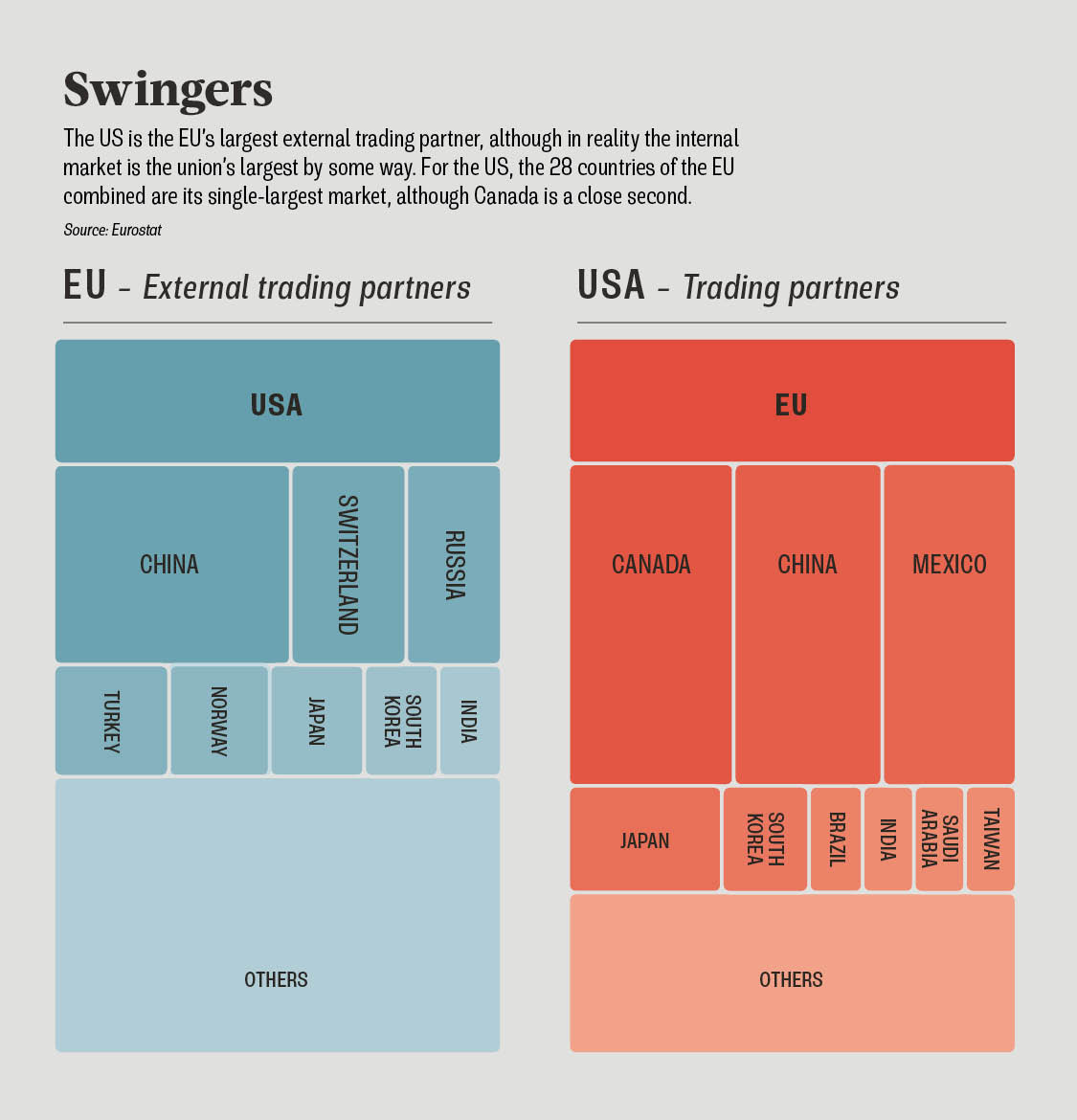The Transatlantic Trade and Investment Partnership is not something that fits neatly on to a protest banner or scans in a chanted slogan; but ‘TTIP’, a wide-ranging trade treaty between the European Union and the United States, has brought thousands out on the streets of France and Germany.
Opposition in the UK is rising too, as critics of the deal, which has been negotiated behind closed doors, warn that it would limit European governments’ ability to maintain control of their utilities and could force privatisations of healthcare services. Pressure groups, including Greenpeace, which released a series of leaked documents from within the TTIP negotiation process, warn that the agreement could also force Europe to water down its environmental protections and food standards.
Among the most controversial aspects of the deal is the ‘investor-state dispute settlement’, or ISDS, which essentially allows companies to challenge public policymaking decisions that put them at a disadvantage. Details on this are sparse, but the Unite union, among others, has warned that it would allow US healthcare companies to sue the UK government if it tried to bring elements of the health system back under public management, essentially preventing re-nationalisation of failing trusts and hastening the privatisation of the NHS.
“It appears we are even being duped over protections for public services. The [leaked] documents show that they are not prioritising the protection of public services,” says Gail Cartmail, the assistant general secretary of Unite, which is campaigning against TTIP, and says that the treaty “poses a real and serious threat to the NHS”.
TTIP has now stalled, as the French government called a halt to negotiations in May. Christopher Bovis, professor of business law at the University of Hull, and an expert on European trade law, says that the apparent stalemate in talks is a reflection of a realisation amongst European negotiators that they have been outmanoeuvred by their counterparts in the US.
France, he says, saw an opportunity through TTIP to gain access to American markets for its national champions, in particular the water management companies Veolia and Suez; as negotiations proceeded, the reciprocal side of the agreement started to look threatening.
The American specifications, are completely different, cheese and chalk, from the European specifications
“As soon as they realised… the impact on agriculture, on cinema, on the softer issues such as culture, the distribution of movies, broadcasting, they realised they were going to have a complete nightmare scenario,” he says. “Hollywood would dominate the French market. That put red flags up.”
A 2013 study, commissioned by the Department for Business, Innovation and Skills and conducted by the London School of Economics, said that a TTIP treaty containing ISDS would have “meaningful economic and political costs”, but “few or no benefits to the UK”. The report was released after a successful request by campaigners under the freedom of information act. The current UK government has been a supporter of TTIP.
[embed_related]
The controversy around ISDS, which could also open governments to intense pressure if they decide to introduce regulations that could be interpreted as anti-business — such as mandating that cigarette packets have plain packaging — is compounded by fears that cooperators between regulators under TTIP would weaken European standards.
As Bovis says: “The American specifications, are completely different, cheese and chalk, from the European specifications. That corresponds to a downward pressure on the European specifications and standardisations.”
This could, warns Gabriel Siles-Brügge, an expert in trade at the University of Manchester and the co-author of TTIP: The Truth about the Transatlantic Trade and Investment Partnership, limit governments’ ability to make policy. “I don’t think it would be the end of public policymaking, but it would certainly act as a constraint,” he says.
Siles-Brügge says that much of the nuance of the negotiations has been lost in the public arguments about the treaty. European governments are unlikely to push through rules that would undermine protections on, for example, the import of US beef containing growth hormones; they might commit to a treaty that puts them on a path towards more deregulation elsewhere. “The more procedural stuff, I think people are missing, and so it can be brought in under the radar,” he says.
For the time being, TTIP looks to have stalled. European negotiators may now enter a slow bicycle race until November, and the US presidential elections. A new administration could mean a new direction. On the other side of the Atlantic, trade has also suddenly become a political rallying point, as presidential hopeful Donald Trump hollers for a new, protectionist America that limits access to Chinese goods and recalls the lost glory days of ‘Made in America’.
“For years, trade was relegated into a more technocratic sphere,” Bovis says. “Now, everywhere, the UK, everywhere in Europe, everywhere in the United States, in Canada as well, you have trade elevated as a prime battleground for ideas.”




